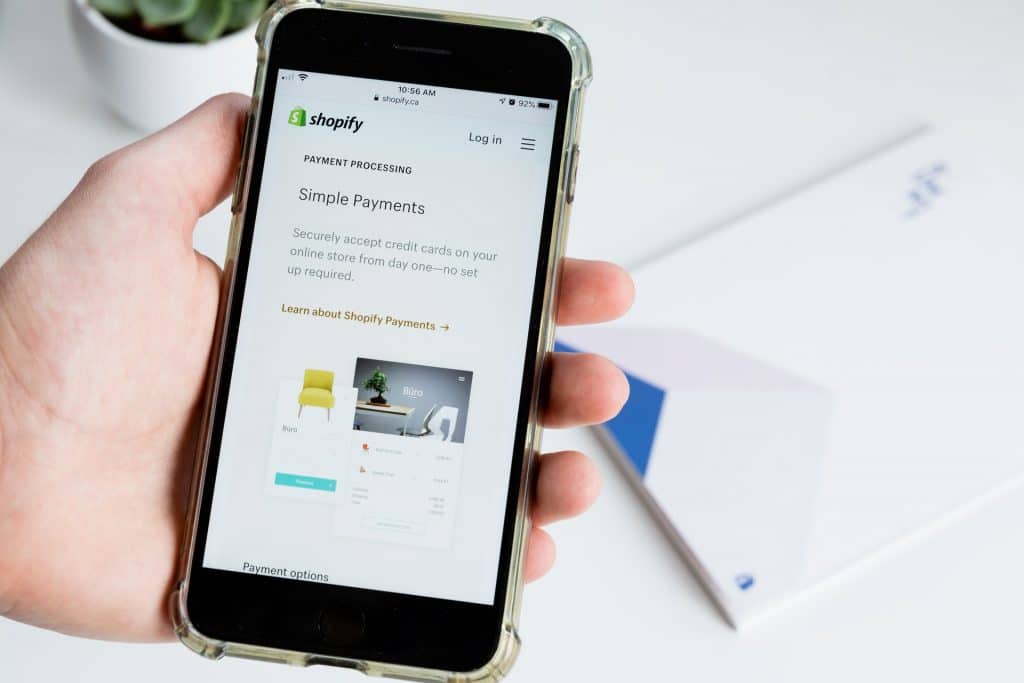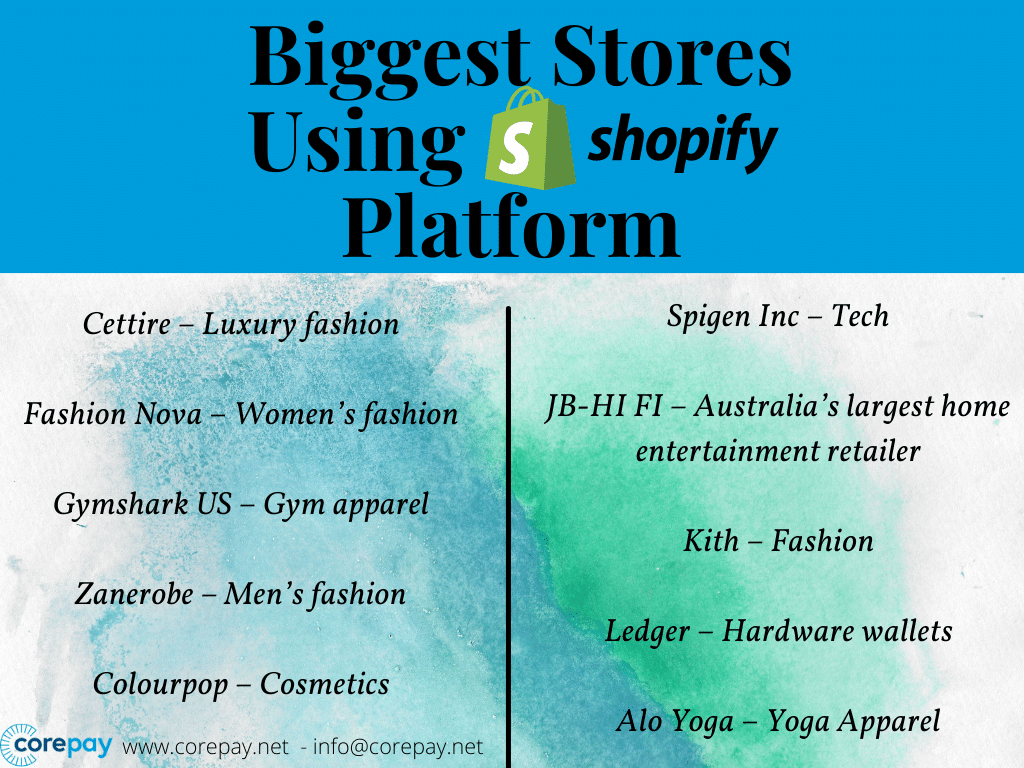High Risk Shopify Merchant Accounts
Last Updated on July 7, 2023 by Corepay
Shopify is the home to over 2 million active businesses in 2023. With every well-established online company comes the need for reliable payment processing. Having a third-party merchant account for Shopify can be incredibly effective for businesses, primarily since Shopify does not offer processing for high-risk merchants. This means that you will need a high-risk Shopify merchant account alternative.
If you are an eCommerce business owner looking to start your Shopify store, you have reached the right place. Credit card processing can be confusing for those unfamiliar with it, yet it is an essential part of your business.
Certain credit card processing companies offer different pricing structures, and they also tend to specialize in various high-risk industries and have various acquiring bank relationships.
What Makes Certain Shopify Stores Considered High-Risk?

Several factors can lead to a credit card processor determining your business high-risk. For example, with Shopify, most transactions are going to be card-not-present, which is something that makes your business a little bit riskier.
That said, CNP transactions themselves typically won’t make your business high-risk.
With CNP transactions usually comes a higher number of chargebacks. Chargebacks are transactions that are disputed by the cardholder and returned to their card. Overall, chargebacks are terrible for merchants as they often end up having to pay a fee.
Here are the main reasons Shopify stores can be deemed high-risk:
Chargebacks
Chargebacks are usually the culprit for Shopify stores being deemed high-risk. Depending on the nature of your business, your chargebacks could vary significantly from product to product.
To limit chargebacks, working with a high-risk processor can make all the difference. High-risk processors will be able to guide you on ways to reduce your chargebacks and keep your fees low.
As your Store starts to get hit with chargebacks, your fees significantly increase and can get your merchant account frozen or terminated, especially when working with low-risk processors such as Shopify Payments/Stripe.
While chargebacks are something you don’t want to encounter frequently, the good news is that there are ways to reduce your number of chargebacks.
With Shopify stores, the biggest thing you can do as a business is clearly state your website’s refund policy.
On top of this, collect as many details from your customers as possible.
You can collect things such as previous orders, addresses, and order numbers.
Businesses that have 24/7 customer service available always have a lower number of chargebacks as well. This is because customers will get upset and look to reach out to the company only to run into sub-par customer service. The customer then goes and disputes the charge with the bank, and at that point, it becomes a problem for your business.
Your business should also be using anti-chargeback tools, which will help you dramatically decrease the number of chargebacks your business is hit with.
Financial History
A poor financial history can make it so your online business is determined high-risk. Processors and banks will look at both personal and business financial history. While you may be deemed high-risk for Shopify store, you still can find reliable processing, as long as you choose a high-risk solution.
Risky Industry
One of the things you can’t change as a business is the nature of it. If you operate in an industry such as adult, CBD, vape, firearms, or dating, you will be likely deemed high-risk.
You can view a few of these pages below if you are in these industries:
These industries typically experience a high number of chargebacks and they also can damage a bank/processor’s reputation. When selling in any of these industries, it is vital that you have incredible customer service as well as security.
These two things will help you fight against chargebacks, which overall saves your business money.
How To Add Payment Processing For Shopify
Adding payment processing for Shopify is simple. Should you using Shopify’s payment gateway, then you will do the following:
Should you choose to do your credit card processing through Corepay, we will happily integrate payment processing for you to make sure everything is configured correctly.
Applying For A Shopify High-Risk Merchant Account
Should you be looking for third-party credit card processing for your Shopify store, congratulations. New business owners often don’t realize that their business might be labeled high-risk by Shopify.
Because of this, their accounts can be frozen or terminated, leaving them with locked funds and no immediate way of processing transactions.
This can be devastating for smaller businesses just starting to land sales and turn a profit.
At Corepay, we do everything we can to ensure a quick approval, fast transition, and 100% reliable/transparent credit card processing.
Applying for your merchant account is painless and quick. All you need to do is go to our application page and answer a few questions.
You will also need the following:
The more proof/information you can provide to us, the faster we can get you set up and processing payments.
Alternatives To Shopify

While Shopify has an incredibly impressive offering, high-risk merchants may have trouble finding payment processing for their business. The additional 2% plus processing fees that Shopify charges should you choose to use a high-risk processor can be hard to deal with.
There are a couple of great alternatives to Shopify that allow for the use of third-party processing without the additional fees that Shopify charges.
Konnektive
Konnektive is a great CRM similar to Shopify that allows you to use set up the back-end of your store and begin processing payments. Once you have it up and running, you will use a payment service provider to process credit/debit card transactions.
Our payment gateway, Solidgate, integrates flawlessly with Konnektive and will allow businesses to easily process payments with reporting.
Konnektive allows online businesses to quickly put together an impressive store tailored to the specific needs and desires of customers.
If you haven’t heard of Konnektive or checked out what they can offer your business, we highly recommend doing so.
Sticky.io
Sticky is another CRM that is a quality alternative to Shopify. Sticky.io works with some of the leading payment gateways globally, including ours. Should you be looking to process payments in an industry deemed high-risk, Sticky.io would be a great fit for your eCommerce business.
Should you choose Sticky.io, we encourage you to fill out an application with us to see what we can do for your business.
Did Shopify Shut Down Your Online Store?
Suppose you have found yourself in the unfortunate position of having your Store terminated or your funds withheld. In that case, the first thing you will want to do is begin searching for a payment processing solution for your business.
While Shopify is an effective platform, there are many products/services that are against Shopify’s terms of service.
Before beginning to process payments through Shopify, be sure to view their terms of service page, which displays products/services that Shopify bans.
This will save you money in the long run, as well as the frustration of finding out your Store has been shut down.
If your Shopify merchant account was terminated and you’re looking for processing, contact us today to find out what we can do for you.
How To Choose The Best Shopify Payment Processing Solution
When choosing payment processing for your Shopify business, the first question you need to figure out is, “am I considered high-risk?”
If the answer is yes, you will need to find a high-risk credit card processing solution.
The next thing you will want to do is to fill out applications with different payment processing providers and compare rates, what they can offer as far as anti-chargeback solutions, payment gateways, and expertise to your industry.
Why Should Shopify Stores Choose Corepay For Their Credit Card Processing?
At Corepay, we specialize in high-risk credit card processing. We have over two decades of high-risk processing experience, and we also have our own payment gateway, Solidgate, explicitly designed for high-volume and high-risk businesses.
We are highly familiar with Shopify’s platform, and we have a great understanding of high-risk businesses.
Having a high-risk merchant account not only helps mitigate chargebacks, it also gives you a better chance to not have your account frozen or terminated.
Shopify will charge an additional fee for the use of any outside payment processor; however, any business deemed high-risk will need to figure out a high-risk processing solution in order to continue processing transactions.
Should you choose Corepay for your processing, you will be choosing reliable payment processing, bespoke customer service, and 100% transparency.
The following are reasons that you should choose Corepay for your high-risk processing:
Does Shopify Support CBD Merchants?
Shopify supports CBD merchants on its platform; however, they do their credit card processing through Stripe, which does not support CBD.
This means if you are looking for a CBD merchant account for Shopify, you will need a third-party processor to come on board for your payment processing.
Shopify Overview

There are currently over 2 million online stores that use Shopify for their payment processing. Overall, Shopify takes up over 11% of the eCommerce market share.
That puts Shopify at third when it comes to total market share in the eCommerce world. The two companies ahead of Shopify are Woocommerce and Squarespace. – We also offer high-risk Woocommerce merchant accounts here.
In 2020, the number of shoppers that shopped through Shopify increased by 52% from 2019. Another mind-blowing statistic is that over 26,400 partners referred a merchant to Shopify in one year.
By industry, retail is dominant for Shopify. The top three biggest industries for Shopify are retail, fashion, and computer software. All three of these are generally going to be considered low-risk by credit card processors.
Currently, the biggest stores using Shopify’s platform are the following:
- Cettire – Luxury fashion
- Fashion Nova – Women’s fashion
- Gymshark US – Gym apparel
- Zanerobe – Men’s fashion
- Colourpop – Cosmetics
- Spigen Inc – Tech
- JB-HI FI – Australia’s largest home entertainment retailer
- Kith – Fashion
- Ledger – Hardware wallets
- Alo Yoga – Yoga Apparel
There are hundreds and thousands of successful Shopify stores. Many of these stores have had success using more than one credit card processor to mitigate risk.
Should one of your merchant accounts get flagged or put on hold, your business won’t take as much of a loss if you have multiple merchant accounts for your processing.
What Goods/Services Does Shopify Not Allow?
Shopify allows most legal products; however, they do have a list of products that are banned from their platform. Should you be a merchant looking to use Shopify, the following are products that you will not be able to sell:
Who does Shopify Use For Their Payment Processing?
Shopify has a partnership with Stripe, and they also offer over 100 third-party payment gateway solutions. Like Paypal, Stripe also specializes in low-risk processing and will not process for high-risk merchants.
The name of Shopify’s processing is called Shopify Payments, and it is offered for low-risk merchants.
Wrapping Up
Having the right payment processing solution for Shopify is crucial for any successful eCommerce business. We hope this guide covered everything you need to know about Shopify merchant accounts, and we would love to speak with you about high-risk processing for your business.
Fill out an application to see what Corepay can do as an alternative to Shopify payments today!
We appreciate you following Corepay’s blog. Let’s collaborate, send us your article suggestions, questions, and/or feedback to: [email protected].
